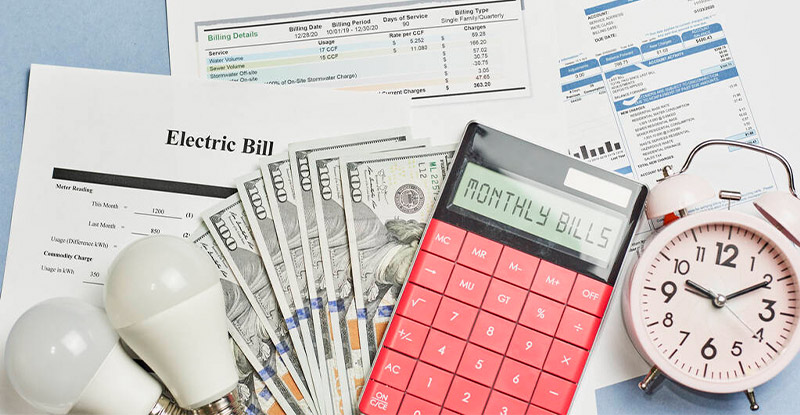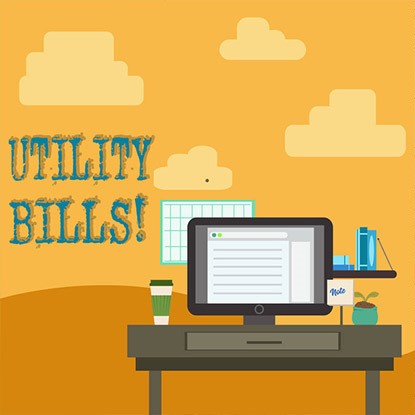Efficient Utility Bill Processing for Businesses
Master the art of utility bill processing with expert insights. Explore automation solutions, best practices, and tips to enhance accuracy and productivity in managing your utility expenses.

Master the art of utility bill processing with expert insights. Explore automation solutions, best practices, and tips to enhance accuracy and productivity in managing your utility expenses.

Utility bill processing can be a tedious task for businesses, especially if you have a large number of accounts to manage. Utility bills make up a significant portion of a business’s expenses, and it’s crucial to ensure timely payment to avoid late fees, service disruptions, or even legal action.
But how can you manage utility bills efficiently and streamline the process? In this guide, we’ll explore best practices and some tips for managing utility bills with ease.

Experience the power of docAlpha AI-driven data capture for utility bills. Optimize efficiency, reduce costs, and enhance accuracy. Request your demo today and transform your workflow!
Efficient utility invoice processing is essential for businesses and individuals to manage their utility expenses effectively, avoid billing errors, and make informed decisions regarding resource consumption and cost control. Here’s how to streamline utility bill processing by the type.
Electricity bills typically include charges based on the amount of electricity consumed. Processing involves verifying meter readings, tariff rates, and any applicable discounts or subsidies. Special attention may be given to peak-hour rates and demand charges for commercial and industrial consumers.
Water bills are based on water consumption, and the processing includes validating meter readings, assessing charges for water supply and wastewater treatment, and ensuring compliance with water conservation regulations. In some cases, tiered pricing structures may apply.
Gas bills are related to natural gas consumption for heating, cooking, and other purposes. Processing involves verifying meter readings, checking for leaks or anomalies, and analyzing charges based on usage and gas rates.
Telecommunications bills encompass services like phone lines, internet, and cable TV. Processing involves reviewing service plans, usage charges, and any additional fees or taxes. Optimization may include adjusting plans to align with actual usage.
Waste management bills pertain to services like trash collection and disposal. Processing includes verifying the number of pickups, bin sizes, and any extra charges for specialized waste removal. Cost control may involve optimizing waste management practices.

RELATED: 5 Use Cases of Intelligent Document Processing
Heating, ventilation, and air conditioning (HVAC) bills involve energy consumption for climate control. Processing includes monitoring energy usage, optimizing temperature settings, and ensuring HVAC systems are well-maintained for efficiency.
Bills related to renewable energy sources, such as solar or wind power, require processing to verify energy generation and any associated credits or incentives. Monitoring renewable energy systems’ performance is crucial for accurate billing.
Municipal bills encompass various services like street lighting, sewage, and public transportation. Processing involves reviewing charges, assessing tax obligations, and ensuring compliance with municipal regulations.
In some cases, utility bills may combine multiple services, such as water, gas, and electricity, on a single invoice. Processing requires meticulous verification of each service’s charges and allocation of expenses to the appropriate departments or cost centers.
Commercial and industrial utility bills can be complex due to the scale of operations. Processing includes detailed verification of energy consumption, demand charges, and tariff structures. Cost allocation may be necessary for large organizations with multiple facilities.
Effective utility bill processing for different bill types involves accurate data collection, validation, cost allocation, and optimization strategies tailored to each utility service. Automation and specialized software can streamline these processes, ensuring that organizations can efficiently manage their utility expenses while adhering to sustainability goals and regulatory requirements.
Embrace the future of utility bill processing.
Harness the automation capabilities of docAlpha to streamline data capture, eliminate bottlenecks, and gain real-time insights. Request a free trial now and supercharge your operations!
Book a demo now
When it comes to utility bill management, there are several basic principles that can help individuals and organizations effectively control and optimize their utility expenses. Here are some key principles to consider:
RELATED: Standard Invoice: Understanding the Basics of an Invoice
By following these basic principles of utility bill management, individuals and organizations can not only control costs but also contribute to environmental sustainability and efficient resource use.
Don’t let utility bills slow you down. Discover how docAlpha’s intelligent data capture can revolutionize your financial management. Take control, improve accuracy, and save valuable time. Contact us for a personalized consultation!
Book a demo now
Utility invoice processing is the systematic handling and management of invoices related to various utility services, such as electricity, water, gas, and more. This crucial process ensures that businesses accurately receive, review, and pay their utility bills while optimizing efficiency and controlling costs. Here are some key aspects of utility invoice processing.
The process begins with the receipt of utility bills from service providers. These bills may be received in various formats, including paper invoices, electronic statements, or through online portals.
Invoices need to be accurately and efficiently entered into the financial systems or utility bill management software. This step involves capturing important data points such as account numbers, billing amounts, due dates, and consumption details.
Once the data is captured, invoices must undergo a verification process to ensure accuracy. This includes checking that the charges align with contractual agreements, meter readings, and service terms.
In some organizations, invoices require approval from relevant personnel or departments before payment. This step ensures that invoices are in line with budgetary constraints and cost centers.
After verification and approval, invoices are scheduled for payment. Payment methods may vary and can include electronic transfers, checks, or automated payments through financial systems.
Proper record-keeping of all utility invoices, payment receipts, and related documentation is essential for audit purposes and future reference. Utility invoice processing often involves generating reports that provide insights into consumption patterns, cost trends, and opportunities for cost reduction or optimization.
Compliance with regulatory requirements, tax obligations, and environmental standards is crucial in utility invoice processing. Staying informed about changes in regulations is vital.
No wonder that with so many steps involved, many organizations use automation tools and software solutions to streamline the entire utility invoice processing workflow. Automation can reduce errors, save time, and improve efficiency.
Tired of manual data entry for utility bills?
Let docAlpha do the heavy lifting. Enjoy automated data capture, reduce errors, and make informed decisions faster. Start your data capture journey
with docAlpha today!
Book a demo now
Managing utility bills effectively starts by keeping accurate records. Keep track of your bills and payments in a centralized system, and ensure that every payment is recorded on time. Having accurate records makes it easy to identify any discrepancies in billing, avoid duplicate payments, and make timely payments.
Automating utility bill payments is an excellent way to streamline the payment process. Many billing companies offer automatic payments, so you don’t have to worry about missing deadlines or late payments. Automating payments also reduces the need for physical checks and eliminates the possibility of errors.
RELATED: AI-Powered Invoice Data Extraction: Beyond OCR
To avoid late payments or service disruptions, monitor your utility bills regularly. Review your bills regularly to identify changes in rates, consumption, or billing errors. Regular monitoring will also enable you to identify areas that require improvements and negotiate better rates with your service providers.
Utility bill management tools streamline the entire billing process, providing a comprehensive view of your utility bills. These tools automate data entry, monitor billing data, and streamline payment processing, allowing you to focus on your core business tasks. Utility bill management tools also provide real-time access to data and analytics, allowing you to make informed decisions on managing your utility expenses.
Utility bill processing can be challenging for businesses, but with the right approach, it can be streamlined and optimized. Keep accurate records and automate the payment process to save time and eliminate errors.
Monitor your utility bills regularly to identify opportunities for improvement and consider outsourcing the task to a third-party. And most importantly, use a utility bill management tool to streamline the entire process and unlock insights into your utility expenses.
With these tips in mind, you can manage your utility bills with ease and stay on top of your business expenses.
Transform utility bill processing into a breeze with docAlpha. Boost productivity, gain actionable insights, and optimize cost control. Join the docAlpha revolution and experience data capture like never before. Get started now!
Book a demo now
These FAQs provide valuable insights into the world of utility bill processing, helping individuals and organizations better understand its importance and how to navigate the process effectively.
Utility bill processing refers to the systematic handling and management of invoices related to various utility services, such as electricity, water, gas, telecommunications, and waste management.
Utility bill processing is crucial for accurate financial management, cost control, and ensuring that organizations or individuals pay only for the services they consume. It helps prevent overbilling, identify anomalies, and optimize resource usage.
Utility bill processing covers various bill types, including electricity, water, gas, telecommunications, waste management, heating and cooling (HVAC), renewable energy, municipal services, and more.
Utility bill processing involves steps like bill receipt, data capture, verification, approval, payment, record-keeping, expense allocation, reporting, auditing, and compliance monitoring.
Automation streamlines utility bill processing, reduces errors, saves time, and improves efficiency. It also provides real-time insights into consumption and cost trends.
Optimizing utility bill processing involves reviewing usage patterns, implementing energy-saving measures, renegotiating contracts, and conducting regular audits to identify billing errors or opportunities for cost reduction.
Cost allocation involves distributing utility expenses across different departments, cost centers, or locations within an organization. It ensures that each entity bears its fair share of the utility costs.
Staying informed about regulatory changes, accurately verifying utility bills, and conducting regular audits are essential steps to ensure compliance with utility billing regulations.

Common challenges include the complexity of utility bills, billing errors, missed payments, managing multiple service providers, and optimizing resource consumption.
Yes, many organizations outsource utility bill processing to specialized firms or use utility management software to streamline the process.
Tracking utility expenses involves regular monitoring, setting energy-saving goals, adopting efficient practices, and investing in energy-efficient technologies.
Yes, utility bill management software and automation tools are available to simplify the processing, analysis, and reporting of utility bills.
Sustainability considerations are essential in utility bill processing, as organizations aim to reduce their environmental footprint by optimizing resource usage and adopting renewable energy sources.
You can begin by assessing your current utility bill management practices, identifying areas for improvement, and exploring automation or software solutions tailored to your needs.
Best practices include regular bill review, energy-saving initiatives, contract management, cost allocation, and staying informed about industry trends and regulatory changes.